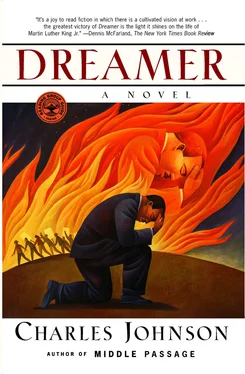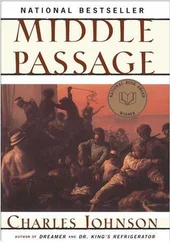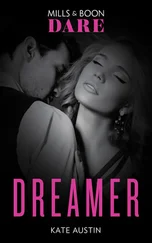Many nights when he lay beside his wife, unable to sleep, he did want to put a gun to his head. To his congregation he’d said, “There is a Mr. Hyde and Dr. Jekyll in us,” and not once did he exclude himself from the realm of sinners, though more than anything else in this world he wanted to be a good man.
One thing — one poem — often steadied him during these nights of despair, lines composed four centuries earlier by his (and his father’s) namesake, Martin Luther:
This life, therefore
is not righteousness
but growth in righteousness
not health but healing
not being but becoming
not rest but exercise.
We are not yet what we shall be
but we are growing toward it.
The process is not yet finished
but it is going on,
this is not the end
but it is the road.
All does not gleam in glory
but all is being purified.
Dexter cracked open his workroom door, holding a football. “Daddy, I’m sorry. I thought you were done working.”
“ I am, but I’m finished,” he said. “At least for now. ”
His son crossed the room, grabbing two of his fingers, and began pulling him outside toward the living room to play. He knew he would give his children this time, regardless of whether they kept him away from his work all evening. They were the Lord’s children, after all, and just as he was the channel for the gospel and not its source, he and his wife were merely the children’s temporary custodians. He knew he had let them down time and again. But Scripture said if a man tried — and kept trying — to serve the good, the true, and the beautiful, Providence would not turn its back. No man, he knew, was given burdens too great for him to carry; indeed, the point was to pass beyond the vanity that he, not God, bore that burden, and realize, even if he had to learn it the hard way and at almost a fatal price, that the challenge of the spiritual was simply this: to be good, truly moral, and in control of oneself for this moment only, because what other moment in time could a man be held responsible for?
“We were pulling for you from the start,” said Groat. He sat at the kitchen table, which he and Withersby had covered with weathered, string-tied portfolios crammed with reams of green-tinted paper. It was the first time I’d seen Groat up close and in strong light. A fat, froggish man, he lifted the soft drink I gave him and drained it in one long swallow. His skin had the texture of rice paper. His sweat smelled oily. Clearly, he did not meet the weight standard set for federal agents, which meant either he or his physician falsified his yearly medical examinations in order to save his job. He talked on for a while in his thick-tongued voice about his arthritis, his recurring knee problems, reciting his weaknesses and defects the way people sometimes do to disarm you, as if to say they know full well their deficiencies and need to mention them before you take notice and think poorly of them. On the other hand, I thought, this might be nothing more than a ploy to shape our opinions of him before we’d properly had time to pass judgment.
“Back in Washington,” he said, giving his brittle, snaplike smile, “there’s a lot of … concern … about what’s happening to Dr. King.” Groat lifted a pack of Winstons from his shirt pocket, lit one, blew smoke toward the ceiling, then flicked the ash into his soda can. “His friends, some of his closest aides, are damned worried. Did you two know that?”
“No,” I said. “Worried about what?”
“Despair, fits of depression.” Groat spread open one of his portfolios, then read from his pages like a doctor delivering a diagnosis, his face knotted around the eyes. “According to reports I’ve got here, he’s got everyone worried. Most of the time he’s morose, distracted. Can’t sleep at night, so he stays up making his staff listen to his sermons over and over again. I figure he’s worn out Andrew Young by now, and earlier this month when he took a vacation — about the first he’s had in years — he damned near scared Ralph Abernathy to death after he got out of bed in his pajamas and started singing “Rock of Ages” on his hotel balcony. More people on Atlanta’s SCLC staff than I care to mention can’t see the logic behind his plan to flood Washington with the poor; he’s known to walk out of those meetings when things don’t go his way. See, I think it’s the strain. All the riots and death in the cities last year. And the years before that. He blames himself for them. And if he doesn’t, if he denies that there’s blood on his hands, his critics lay the corpses right on his doorstep, telling him the day of nonviolence is done, that it was just a foolish dream anyway. Then you got to figure how he’s feeling, what with Adam Clayton Powell calling him Martin Loser King, H. Rap Brown taking over SNCC, donations to the SCLC dropping, and one of his own folks, James Bevel, saying whites are the most savage, bestial, murderous, and corrupt people on earth ’cause at bottom they’re mentally ill. Look at all he’s got stacked against him. Every civil rights leader — Roy Wilkins, Whitney Young, Jackie Robinson, Ralph Bunche, and even King’s own father at first — says his stand against Vietnam is the most reckless thing he’s ever done, a move that’ll splinter the Movement right down the middle, seeing how the military’s been at the forefront of integration, and Johnson’s committed himself to the Great Society’s war on poverty. His former allies feel betrayed. His enemies constantly tell him he’s failed. That’s right, he hasn’t had a civil rights victory in two years. And it’s showing. Hairline cracks here and there, ones he can’t hide. He told Jesse Jackson he ought to go on one of those Gandhi-like fasts unto death to make the rioters in the cities stop and the bickering factions among black activists come together. You watch him out in public, you’ll see how his eyes keep moving, looking for someone about to attack him. That’s called paranoia, isn’t it? When he’s talking, he balls his right fist and keeps rubbing his fingers with his thumb. His speeches sound morbid. They’re all about dying. Hell, you listen close enough, they sound like they’re about a death wish. Not long ago he sent his wife a bouquet of plastic flowers. Red carnations. And when she asked him why, he told her, ‘I wanted to give you something you could always keep.’ Does that sound like a man who has given up or what? Just between you and me, one of his friends has been urging him to see a psychiatrist …”
Withersby rubbed his nose, looking up from his notepad. “He shot that idea down. I think he’s suspicious of psychoanalysis.”
“Comes from his college days,” Groat agreed. “He’s probably worried some shrink’ll go right to those two times he tried to commit suicide when he was a kid.”
“Yes, but look at Malcolm Little. He was better on that score.” Withersby glanced from Groat to me, then to Smith. “During the last year of his life, before those Muslims shot him onstage at the Audubon Ballroom, he was looking into analysis to understand how for seven years he could have preached that doctrine of Yacub, the black scientist, being the inventor of the white race. He told photographer Gordon Parks he’d been mad and sick earlier. Actually, what he said — I’ve got the report right here — was, ‘I was a zombie — like all the rest of them. I was hypnotized, pointed in a certain direction and told to march.‘”
Groat rocked his head. “I read that report. It’s sad it took so long for him to come to his senses. But, you know, I think Little made a lot of sense. I’m all for integration, but you ought to see some of the slime me’n Vincent spend our time investigating, scumbags like Carlo Gambino, the Gallo brothers, and Joe Columbo. I mean, do colored folks really want to integrate with them?”
Читать дальше












